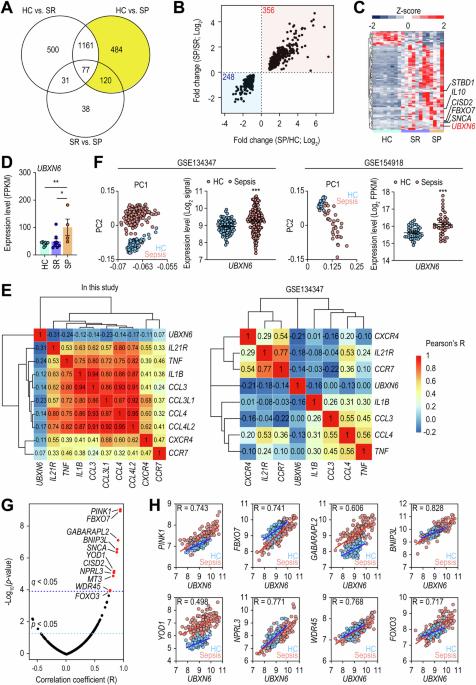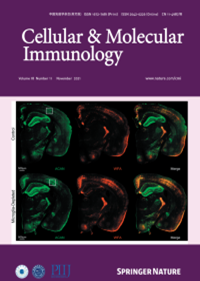Ubiquitin regulatory X (UBX) domain-containing protein 6 is essential for autophagy induction and inflammation control in macrophages
IF 21.8
1区 医学
Q1 IMMUNOLOGY
引用次数: 0
Abstract
Ubiquitin regulatory X (UBX) domain-containing protein 6 (UBXN6) is an essential cofactor for the activity of the valosin-containing protein p97, an adenosine triphosphatase associated with diverse cellular activities. Nonetheless, its role in cells of the innate immune system remains largely unexplored. In this study, we report that UBXN6 is upregulated in humans with sepsis and may serve as a pivotal regulator of inflammatory responses via the activation of autophagy. Notably, the upregulation of UBXN6 in sepsis patients was negatively correlated with inflammatory gene profiles but positively correlated with the expression of Forkhead box O3, an autophagy-driving transcription factor. Compared with those of control mice, the macrophages of mice subjected to myeloid cell-specific UBXN6 depletion exhibited exacerbated inflammation, increased mitochondrial oxidative stress, and greater impairment of autophagy and endoplasmic reticulum-associated degradation pathways. UBXN6-deficient macrophages also exhibited immunometabolic remodeling, characterized by a shift to aerobic glycolysis and elevated levels of branched-chain amino acids. These metabolic shifts amplify mammalian target of rapamycin pathway signaling, in turn reducing the nuclear translocation of the transcription factor EB and impairing lysosomal biogenesis. Together, these data reveal that UBXN6 serves as an activator of autophagy and regulates inflammation to maintain immune system suppression during human sepsis.

含泛素调节 X(UBX)结构域的蛋白 6 对巨噬细胞的自噬诱导和炎症控制至关重要。
含泛素调节 X(UBX)结构域的蛋白 6(UBXN6)是含缬氨酸蛋白 p97(一种与多种细胞活动相关的腺苷三磷酸酶)活性的重要辅助因子。然而,它在先天性免疫系统细胞中的作用在很大程度上仍未被探索。在这项研究中,我们发现 UBXN6 在脓毒症患者体内上调,并可能通过激活自噬而成为炎症反应的关键调节因子。值得注意的是,脓毒症患者体内 UBXN6 的上调与炎症基因谱呈负相关,但与自噬驱动转录因子叉头盒 O3 的表达呈正相关。与对照组小鼠相比,髓系细胞特异性 UBXN6 缺失小鼠的巨噬细胞表现出炎症加剧、线粒体氧化应激增加、自噬和内质网相关降解途径受损更严重。UBXN6 缺失的巨噬细胞还表现出免疫代谢重塑,其特点是转向有氧糖酵解和支链氨基酸水平升高。这些新陈代谢的转变扩大了哺乳动物雷帕霉素靶途径的信号转导,进而减少了转录因子 EB 的核转位并损害了溶酶体的生物生成。这些数据共同揭示了 UBXN6 在人类败血症期间可作为自噬的激活剂并调节炎症以维持免疫系统的抑制。
本文章由计算机程序翻译,如有差异,请以英文原文为准。
求助全文
约1分钟内获得全文
求助全文
来源期刊
CiteScore
31.20
自引率
1.20%
发文量
903
审稿时长
1 months
期刊介绍:
Cellular & Molecular Immunology, a monthly journal from the Chinese Society of Immunology and the University of Science and Technology of China, serves as a comprehensive platform covering both basic immunology research and clinical applications. The journal publishes a variety of article types, including Articles, Review Articles, Mini Reviews, and Short Communications, focusing on diverse aspects of cellular and molecular immunology.

 求助内容:
求助内容: 应助结果提醒方式:
应助结果提醒方式:


